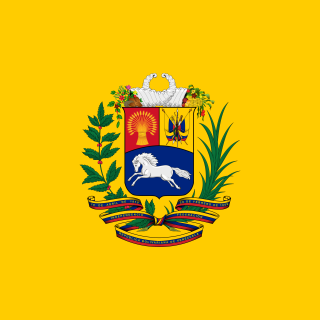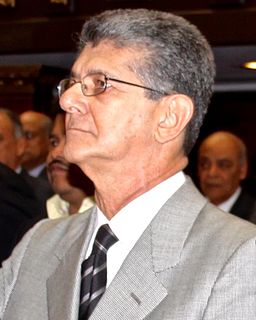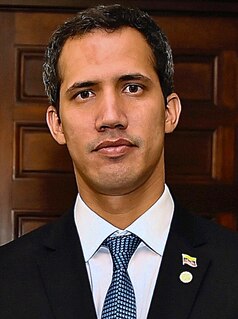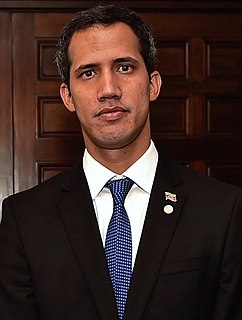| |||||||||||||||||||||||||
All 167 seats in the National Assembly 84 seats needed for a majority | |||||||||||||||||||||||||
|---|---|---|---|---|---|---|---|---|---|---|---|---|---|---|---|---|---|---|---|---|---|---|---|---|---|
| |||||||||||||||||||||||||
| |||||||||||||||||||||||||
Parliamentary elections are scheduled to be held in Venezuela by 2020 to elect the 167 deputies of the National Assembly.
| |||||||||||||||||||||||||
All 167 seats in the National Assembly 84 seats needed for a majority | |||||||||||||||||||||||||
|---|---|---|---|---|---|---|---|---|---|---|---|---|---|---|---|---|---|---|---|---|---|---|---|---|---|
| |||||||||||||||||||||||||
| |||||||||||||||||||||||||
Parliamentary elections are scheduled to be held in Venezuela by 2020 to elect the 167 deputies of the National Assembly.
In the midst of the ongoing constitutional crisis, a different body, the Constituent Assembly was elected in 2017, with the intent of re-writing the Venezuelan Constitution. From that point forward, the two legislatures have operated in parallel, with the National Assembly forming the primary opposition to president Nicolás Maduro, and with the Constituent Assembly being his primary supporters. As of May 2019, the Constituent Assembly mandate is expected to expire on 31 December 2020 (after National Assembly elections are concluded), a measure that replaces the previous resolution of August 2017 that established its validity for at least two years. [1]
In 2018, Nicolás Maduro proposed holding the parliamentary elections alongside the presidential elections scheduled between April and May 2018. However, the proposal was later denied by the National Electoral Council, which stated that holding both elections together would be too complicated. [2]
In February 2019, Maduro announced support, which was proposed by the Constituent Assembly, for an early election within 2019. [3] During a speech at a pro-government rally celebrating the 20th anniversary of the revolution led by former President Hugo Chavez, He stated: "They [the opposition] want to bring forward elections, let's have elections". [4]
As of November 2019, Juan Guaidó and Stalin González, along with former rector of the National Electoral Council, Vicente Díaz, have declared that the election would not solve the nationwide crisis. [5] [6] [7] Guaidó said that the opposition would not participate in any space that did not contribute to the solution of the crisis. [5]
The 167 members of the National Assembly consist of 113 seats elected by first-past-the-post voting, 51 elected by proportional representation and three reserved for members of the indigenous community. [8]

The National Assembly is the de jure legislature for Venezuela that was first elected in 2000. It is a unicameral body made up of a variable number of members, who were elected by a "universal, direct, personal, and secret" vote partly by direct election in state-based voting districts, and partly on a state-based party-list proportional representation system. The number of seats is constant, each state and the Capital district elected three representatives plus the result of dividing the state population by 1.1% of the total population of the country. Three seats are reserved for representatives of Venezuela's indigenous peoples and elected separately by all citizens, not just those with indigenous backgrounds. For the 2010-2015 period the number of seats was 165. All deputies serve five-year terms. The National Assembly meets in the Federal Legislative Palace in Venezuela's capital, Caracas.

The President of Venezuela, officially known as the President of the Bolivarian Republic of Venezuela is the head of state and head of government in Venezuela. The president leads the National Executive of the Venezuelan government and is the commander-in-chief of the National Bolivarian Armed Forces. Presidential terms were set at six years with the adoption of the 1999 Constitution of Venezuela, and presidential term limits were removed in 2009.

Nicolás Maduro Moros is a Venezuelan politician serving as president of Venezuela since 2013, with his presidency being disputed with Juan Guaidó since January 2019.

Parliamentary elections were held in Venezuela on 6 December 2015 to elect the 164 deputies and three indigenous representatives of the National Assembly. They were the fourth parliamentary elections to take place after the 1999 constitution, which abolished the bicameral system in favour of a unicameral parliament, and the first to take place after the death of President Hugo Chávez. Despite claims from the opposition of a possible last-minute cancellation, the elections took place as scheduled, with the majority of polls showing the Democratic Unity Roundtable (MUD) holding a wide lead over the ruling United Socialist Party of Venezuela (PSUV) and its wider alliance, the Great Patriotic Pole (GPP).

The Constituent National Assembly is a constituent assembly elected in 2017 to draft a new constitution for Venezuela. Its members were elected in a special 2017 election that was condemned by over forty mostly Latin American and Western states. The Democratic Unity Roundtable—the opposition to the incumbent ruling party—also boycotted the election claiming that the Constituent Assembly was "a trick to keep [the incumbent ruling party] in power." Since the opposition did not participate in the election, the incumbent Great Patriotic Pole, dominated by the United Socialist Party of Venezuela, won almost all seats in the assembly by default.

Rafaela Requesens is a former President of the Federation of the Students Center of the Central University of Venezuela (FCU–UCV), an organiser of student protests in Venezuela, and an activist in the country. She was a prominent figure of the 2017 Venezuelan protests, along with her brother, Juan Requesens, and has since become a prominent democracy activist.
Events of 2019 in Venezuela.

Juan Gerardo Guaidó Márquez is a Venezuelan politician, a member of the social-democratic Popular Will party, federal deputy to the National Assembly representing the state of Vargas, and currently serves as the President of the National Assembly of Venezuela since 5 January 2019. On 23 January 2019, Guaidó and the National Assembly declared he was acting President of Venezuela, receiving formal recognition of legitimacy by almost 60 governments worldwide, and starting the 2019 Venezuelan presidential crisis by challenging Nicolás Maduro's presidency.

The second inauguration of Nicolás Maduro as President of Venezuela took place on Thursday, 10 January 2019. The inauguration involved the swearing-in of Nicolás Maduro for his second term, and, especially within the context of Maduro's election, has been controversial and contested by various figures and organizations.

A crisis concerning who is the legitimate President of Venezuela has been underway since 10 January 2019, with the nation and the world divided in support for Nicolás Maduro or Juan Guaidó.

The 2019 Venezuelan protests are a collection of protests that have been organized, since 11 January, as a coordinated effort to remove Nicolás Maduro from the presidency. Demonstrations began following Maduro's controversial second inauguration, developing into a presidential crisis between Maduro and National Assembly president Juan Guaidó. The protests also include counter-demonstrations organized by those who support Maduro.
Iván Stalin González Montaño is a Venezuelan lawyer and politician. On 26 September 2010 he was elected as deputy of the National Assembly for the fifth electoral district of Caracas, he presided the Administration and Services Parliamentary Commission and between 2016 and 2017 he was elected as leader of the MUD opposition fraction. On 2019 he was named second Vicepresident of the Assembly.
Nicolás Maduro, incumbent President of Venezuela since 2013 and successor of Hugo Chávez, was officially nominated for re-election as the presidential candidate of the Great Patriotic Pole (GPP) on 4 February 2018.

During the 2019 Venezuelan presidential crisis concerning who is the legitimate President of Venezuela, reactions and responses to the crisis have been divided.
The Statute Governing the Transition to Democracy to Re-establish the Validity of the Constitution of the Bolivarian Republic of Venezuela is a statute adopted by the Venezuelan National Assembly that defines the "duration of a transition government and its political and economic responsibilities". Approved on 5 February 2019, through its seven chapters and thirty-nine articles, the Transition Statute "governs the installation of a provisional Government and the convocation of free elections", and "establishes the election of new rectors of the National Electoral Council, new magistrates of the Supreme Tribunal of Justice and new representatives of the Citizen Power." It also establishes that – in the absence of a constitutionally elected president – the National Assembly President is the Acting President of Venezuela.
The negotiations during the crisis in Venezuela are the negotiation and dialogue attempts and processes between the government of President Nicolás Maduro and the Venezuelan opposition.

Defections from the Bolivarian Revolution occurred under the administrations of Presidents Hugo Chávez and Nicolás Maduro. The 2019 Venezuelan presidential crisis concerning who is the legitimate President of Venezuela has been underway since 10 January 2019, when the opposition-majority National Assembly declared that incumbent Nicolás Maduro's 2018 reelection was invalid and the body declared its president, Juan Guaidó, to be acting president of the nation. Guaidó encouraged military personnel and security officials to withdraw support from Maduro, and offered an amnesty law, approved by the National Assembly, for military personnel and authorities who help to restore constitutional order.

On 30 April, during the 2019 Venezuelan presidential crisis, a group of several dozen military personnel and civilians joined Juan Guaidó in his call for an uprising against Nicolás Maduro as part of what he labeled "Operation Freedom". Reuters reported an "uneasy peace" by the afternoon of 30 April. During the uprising attempt, opposition leader Leopoldo López was freed from house arrest after five years imprisoned. The head of the Bolivarian Intelligence Service, Manuel Cristopher Figuera, denounced the Maduro government, was dismissed from his position, and went into hiding. At least 25 military men who opposed Maduro sought asylum at the Brazilian embassy in Caracas.
Presidential elections are scheduled to be held in Venezuela by 2024 to choose a president for a six-year term beginning in January 2025.
|journal= (help)